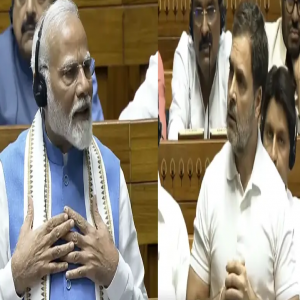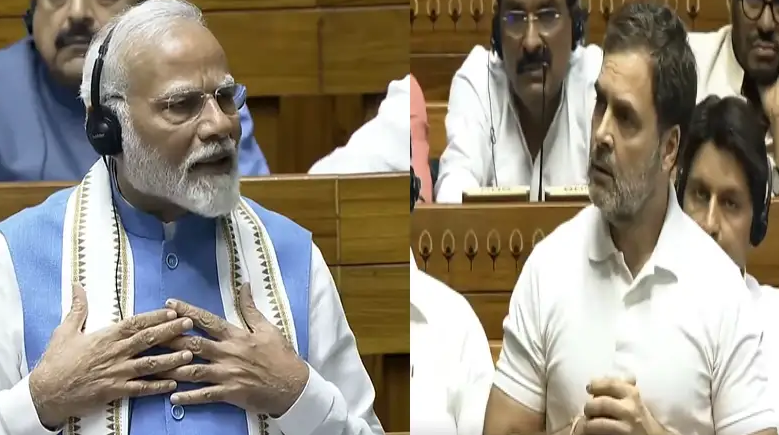
.png) M L Satyan
M L Satyan

The Prime Minister Modi has branded Rahul, the Opposition Leader, as "Balak Buddhi." Earlier, the same Modi used to address Rahul as "Pappu." By using the term Balak Buddhi, Modi has stooped to the lowest level of communication. In his concluding address to thank the President, Modi showered abundant abuses on Congress and all its leaders. He never spared Nehru, Indira Gandhi and Rajiv Gandhi.
While accusing Rahul of showing the pictures of gods, Modi said the images or pictures of gods are for "darshan" (worship) and not for "pradarshan" (exhibition). Knowingly or unknowingly, Modi has utterly contradicted himself. During his tenure as PM from 2014, he has visited several temples, Gurudwaras and churches. All such visits were used for sheer self-publicity. He has always projected himself as a superman who is superior to God.
I wish to highlight "Balak Buddhi," which Modi used in his speech in Parliament. I wish to contrast it with "Pagal Buddhi". Firstly, why should Modi compare Rahul's mind with that of children? Is a child's mindset bad? By using these terms, Modi is discriminating against children. The Child Rights Commission must take action against him.
Let us examine the essential characteristics of children.
Simplicity: Children are simple. They are direct in their thinking, speaking and behaviour. On the contrary, Modi's thoughts, words and actions are never simple. He has no right to criticise the simplicity of children.
Honesty: Honesty is more than telling the truth to others. It is also about being truthful with yourself. Children tend to be honest and sincere on most occasions. On the contrary, Modi, during his political career, never exhibited honesty. He is dishonest to himself, others, and to God.
Welcoming: A child is always sociable and tries to mingle with anyone, whether good or bad. On the contrary, Modi is welcoming and sociable only with his select corporate and political friends. He rarely mingles with the ordinary people of the country. Of course, he goes to them only to seek their votes and nothing else.
Kindness: Children are generally kind and display gentle behaviour. On the contrary, Modi is always arrogant and proud.
Compassion: Compassion is sympathising with those who are suffering. Any child cannot tolerate anyone, whether human or animal, suffering. For example, no child likes to see a mother or sibling being beaten up or an animal or bird being butchered. On the contrary, Modi has never been compassionate towards suffering people. A recent example is his insensitivity towards the Manipur people.
Creativity: Creativity is a character trait that involves expressing original ideas. Children are usually very creative. They express their ideas in various ways—drawing, speaking, singing, dancing, craft-making, etc. On the contrary, Modi, being the prime minister of a country, is still illiterate and ignorant of many things. He only parrots (the script written by his secretary) and does only what is advised by his personal officials.
Fearlessness: It is not a lack of fear but the ability to rise up to challenge and do something despite the fear. Children are inherently courageous. On the contrary, Modi is fearful of the truth and honest leaders. To hide his fear, he abuses all those who sacrificed their lives for the country.
Curiosity: Curiosity is about being inquisitive and wanting to learn and gain knowledge. Children are consistently found to be curious. Their desire to seek information and knowledge never ends. On the contrary, Modi is interested only in pursuing the failures and weaknesses of others. He always keeps himself busy with fault-finding exercises.
Perseverance: It is a determination to accomplish something despite obstacles and failures. Children have a natural tendency to accomplish what they want. They keep trying until they achieve their goal. On the contrary, Modi has only a selfish goal and agenda for his own development and survival in politics. His contributions to the nation have always been destructive, and he only perseveres in doing all that destroys the nation and those he considers enemies. All of his guarantees are yet to be realised.
Lately, Rahul has emerged as a true, sincere, and committed leader. He has always been pro-poor. He is really concerned about the burning issues of the country. All those, including Modi, who criticised Rahul as "Pappu" have seen him emerging as a people's leader. Modi said that Congress would only be eligible to sit in the Visitor's Gallery of the Parliament. Modi's arrogant mind craved more than 400 seats.
He only desires power, status and selfish enjoyment. Modi had a taste of power as the CM of Gujarat. He used his crooked mind and tactics to the maximum to become the PM. He used many senior leaders as a ladder. Once he climbed that ladder and sat on the PM's chair, he kicked off the ladder (the senior leaders of the BJP) without any mercy. He made them powerless.
Today, Modi cannot tolerate Rahul, who has emerged as the opposition leader. In the past, Modi was never questioned. As the opposition leader, Rahul is questioning Modi and his poor governance today. Modi feels challenged by a person he branded as a "Pappu." So, Modi's mind finds it difficult to accept the right questions posed by Rahul. Hence, he has branded Rahul as possessing a "Balak" mind. By doing this, Modi has disgraced himself. He has once again revealed his "revengeful attitude" by abusing Congress Party and its leaders.
Satyameva Jayate!